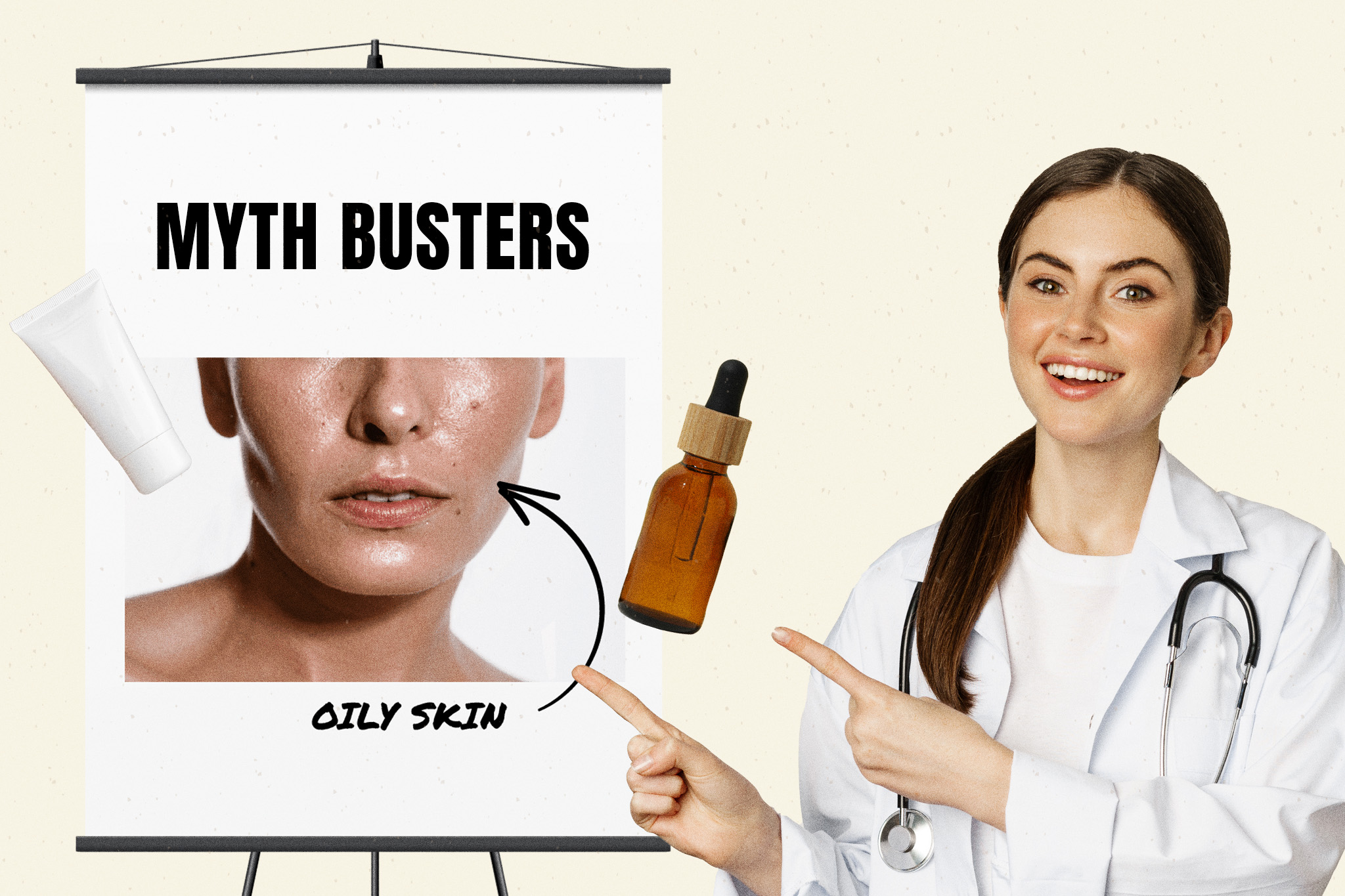No products in the cart.

MYTH BUSTER: Skincare tips for oily skin; the do’s, the don’ts and the lies we have been told.
MYTH BUSTER: Skincare tips for oily skin; the do’s, the don’ts and the lies we have been told.
The skincare world is daunting with everyone becoming a professional esthetician giving unsolicited advice on the internet, this is worse especially when you’re dealing with oily skin. Today, we’re addressing common misconceptions, providing expert advice, and helping you achieve a balanced, healthy complexion. Let’s debunk some myths that the world of social media has told us and set the record straight because here are the best skincare tips for oily skin.
What Having Oily Skin Means
Oily skin occurs when the sebaceous glands produce excess sebum, leading to a shiny appearance, enlarged pores, and a predisposition to acne. While sebum is essential for keeping your skin moisturized and protected, overproduction can result in the quite a few issues.
How to Check if You Have Oily Skin
Identifying oily skin is straightforward. Here are some indicators:
- Shine: Your skin appears shiny and feels greasy a few hours after cleansing.
- Large Pores: Noticeably large pores, particularly around the nose, forehead, and chin.
- Frequent Breakouts: Regular occurrences of acne, blackheads, and whiteheads.
You can also try to cleanse your face with a foaming cleanser and dry it down completely. Let it sit with nothing on it for a couple hours. and check to see if your skin feels tight and like it is pulling or does it feel greasy. It may also feel tight in some places and greasy in others. If it feels tight then you have dry skin, if it feels soft and perhaps a little greasy then you have oily skin and if it’s both then you have combination skin. You can also have oily and dehydrated skin which you can see if you see a lot of oil production, i.e. your face is oily but your skin also feels very dry and not as plush.
The Myths and Why They Are Wrong
- Myth: Oily Skin Doesn’t Need Moisturizer
- Reality: Skipping moisturizer can actually exacerbate oil production. When your skin is dehydrated, it produces more oil to compensate. Opt for a lightweight, non-comedogenic moisturizer to maintain hydration without clogging pores.
- Why: Moisturizers help to balance your skin’s moisture levels. Without it, your skin will think it’s too dry and will overproduce oil to compensate, leading to even oilier skin.
- Myth: You Should Wash Your Face Multiple Times a Day
- Reality: Over-washing can strip your skin of its natural oils, prompting your glands to produce even more oil. Stick to cleansing twice a day with a gentle, sulfate-free cleanser.
- Why: The skin has a natural barrier that keeps it healthy. Over-washing removes this protective layer, causing the skin to overcompensate by producing more oil, which can lead to breakouts and irritation.
- Myth: All Oils Are Bad for Oily Skin
- Reality: Not all oils are created equal. Some, like jojoba and tea tree oil, can help regulate sebum production and have anti-inflammatory properties.
- Why: Oils like jojoba are similar to the skin’s natural sebum and can trick the skin into producing less oil. Tea tree oil has antibacterial properties that can help with acne.
Advice You Should Follow
- Use a Gentle Foaming Cleanser
- Choose a cleanser with salicylic acid or tea tree oil to help control oil and prevent breakouts.
- Why: Salicylic acid penetrates deep into pores to dissolve excess sebum and dead skin cells, preventing clogged pores. Tea tree oil has natural antiseptic properties that can reduce inflammation and kill acne-causing bacteria. Foam cleansers rather than gel cleansers are also much better to use for oily skin.
- Incorporate a Toner
- Use a toner containing witch hazel or niacinamide to minimize pores and reduce shine.
- Why: Witch hazel is a natural astringent that helps to tighten pores and reduce oil production. Niacinamide, a form of Vitamin B3, helps to regulate oil production, reduce inflammation, and improve the skin barrier function.
- Exfoliate Regularly
- Exfoliate 2-3 times a week with a chemical exfoliant (like glycolic acid) to prevent clogged pores and remove dead skin cells.
- Why: Chemical exfoliants like glycolic acid break down the bonds between dead skin cells, allowing them to be easily removed. This prevents them from clogging pores and causing breakouts. Regular exfoliation also promotes cell turnover for smoother, brighter skin. Warning! Make sure you aren’t exfoliating unless you are over 21 – It is not great for young skin!
- Hydrate and Protect
- Use a lightweight, non-comedogenic moisturizer daily, and don’t skip sunscreen. Look for oil-free formulas to protect your skin without adding extra shine.
- Why: Non-comedogenic moisturizers provide necessary hydration without clogging pores. Sunscreen is crucial for protecting the skin from harmful UV rays, which can cause premature aging and increase the risk of skin cancer. Oil-free formulas ensure that you are not adding unnecessary oil to the skin.
Things You Should Avoid
- Heavy Creams and Oils
- Avoid thick, occlusive products that can clog pores and exacerbate oiliness.
- Why: Heavy creams and oils can create a barrier on the skin that traps oil and bacteria, leading to clogged pores and breakouts. Opt for lighter formulations that provide hydration without suffocating your skin.
- Alcohol-Based Products
- Steer clear of toners and astringents with high alcohol content, as they can dry out your skin and lead to increased oil production.
- Why: Alcohol can strip the skin of its natural oils, causing it to become dehydrated. In response, the skin may produce even more oil to compensate for the loss of moisture, resulting in a vicious cycle of oiliness and dryness.
- Over-Exfoliating
- While exfoliation is important, overdoing it can irritate your skin and increase oil production. Stick to 2-3 times a week.
- Why: Over-exfoliating can damage the skin barrier, leading to irritation, redness, and increased oil production as the skin tries to repair itself. Moderation is key to maintaining a healthy balance.
- Skipping Sunscreen
- Never skip sunscreen. Opt for an oil-free, mattifying formula to protect your skin from UV damage without adding extra shine.
- Why: Sunscreen protects your skin from harmful UV rays, which can cause sunburn, premature aging, and increase the risk of skin cancer. Oil-free, mattifying sunscreens provide the necessary protection without contributing to excess oil.
By understanding the unique needs of oily skin and debunking common myths, you can create an effective skincare routine that keeps your complexion balanced and healthy. Remember, the goal is to work with your skin, not against it and remember that your skin is a part of you. Show it love and it will show you love back.


